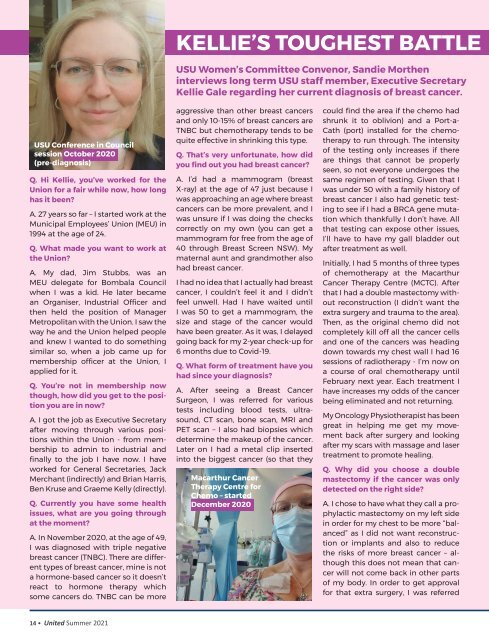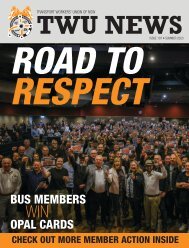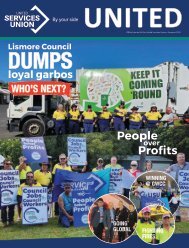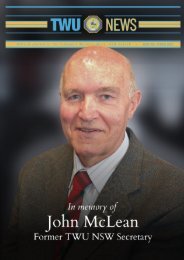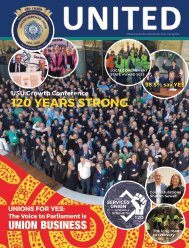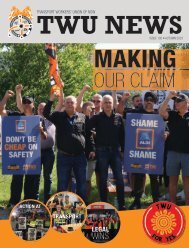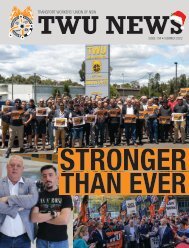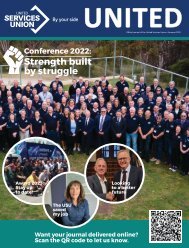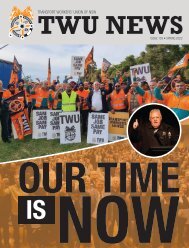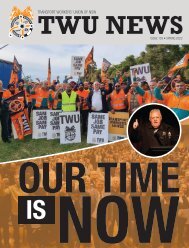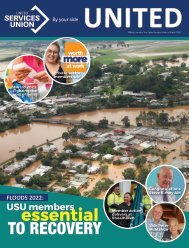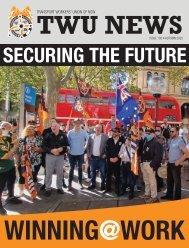United magazine • Summer 2021
The official journal of the United Services Union
The official journal of the United Services Union
You also want an ePaper? Increase the reach of your titles
YUMPU automatically turns print PDFs into web optimized ePapers that Google loves.
KELLIE’S TOUGHEST BATTLE<br />
USU Women’s Committee Convenor, Sandie Morthen<br />
interviews long term USU staff member, Executive Secretary<br />
Kellie Gale regarding her current diagnosis of breast cancer.<br />
USU Conference in Council<br />
session October 2020<br />
(pre-diagnosis)<br />
Q. Hi Kellie, you’ve worked for the<br />
Union for a fair while now, how long<br />
has it been?<br />
A. 27 years so far – I started work at the<br />
Municipal Employees’ Union (MEU) in<br />
1994 at the age of 24.<br />
Q. What made you want to work at<br />
the Union?<br />
A. My dad, Jim Stubbs, was an<br />
MEU delegate for Bombala Council<br />
when I was a kid. He later became<br />
an Organiser, Industrial Officer and<br />
then held the position of Manager<br />
Metropolitan with the Union. I saw the<br />
way he and the Union helped people<br />
and knew I wanted to do something<br />
similar so, when a job came up for<br />
membership officer at the Union, I<br />
applied for it.<br />
Q. You’re not in membership now<br />
though, how did you get to the position<br />
you are in now?<br />
A. I got the job as Executive Secretary<br />
after moving through various positions<br />
within the Union - from membership<br />
to admin to industrial and<br />
finally to the job I have now. I have<br />
worked for General Secretaries, Jack<br />
Merchant (indirectly) and Brian Harris,<br />
Ben Kruse and Graeme Kelly (directly).<br />
Q. Currently you have some health<br />
issues, what are you going through<br />
at the moment?<br />
A. In November 2020, at the age of 49,<br />
I was diagnosed with triple negative<br />
breast cancer (TNBC). There are different<br />
types of breast cancer, mine is not<br />
a hormone-based cancer so it doesn’t<br />
react to hormone therapy which<br />
some cancers do. TNBC can be more<br />
aggressive than other breast cancers<br />
and only 10-15% of breast cancers are<br />
TNBC but chemotherapy tends to be<br />
quite effective in shrinking this type.<br />
Q. That’s very unfortunate, how did<br />
you find out you had breast cancer?<br />
A. I’d had a mammogram (breast<br />
X-ray) at the age of 47 just because I<br />
was approaching an age where breast<br />
cancers can be more prevalent, and I<br />
was unsure if I was doing the checks<br />
correctly on my own (you can get a<br />
mammogram for free from the age of<br />
40 through Breast Screen NSW). My<br />
maternal aunt and grandmother also<br />
had breast cancer.<br />
I had no idea that I actually had breast<br />
cancer, I couldn’t feel it and I didn’t<br />
feel unwell. Had I have waited until<br />
I was 50 to get a mammogram, the<br />
size and stage of the cancer would<br />
have been greater. As it was, I delayed<br />
going back for my 2-year check-up for<br />
6 months due to Covid-19.<br />
Q. What form of treatment have you<br />
had since your diagnosis?<br />
A. After seeing a Breast Cancer<br />
Surgeon, I was referred for various<br />
tests including blood tests, ultrasound,<br />
CT scan, bone scan, MRI and<br />
PET scan – I also had biopsies which<br />
determine the makeup of the cancer.<br />
Later on I had a metal clip inserted<br />
into the biggest cancer (so that they<br />
Macarthur Cancer<br />
Therapy Centre for<br />
Chemo – started<br />
December 2020<br />
could find the area if the chemo had<br />
shrunk it to oblivion) and a Port-a-<br />
Cath (port) installed for the chemotherapy<br />
to run through. The intensity<br />
of the testing only increases if there<br />
are things that cannot be properly<br />
seen, so not everyone undergoes the<br />
same regimen of testing. Given that I<br />
was under 50 with a family history of<br />
breast cancer I also had genetic testing<br />
to see if I had a BRCA gene mutation<br />
which thankfully I don’t have. All<br />
that testing can expose other issues,<br />
I’ll have to have my gall bladder out<br />
after treatment as well.<br />
Initially, I had 5 months of three types<br />
of chemotherapy at the Macarthur<br />
Cancer Therapy Centre (MCTC). After<br />
that I had a double mastectomy without<br />
reconstruction (I didn’t want the<br />
extra surgery and trauma to the area).<br />
Then, as the original chemo did not<br />
completely kill off all the cancer cells<br />
and one of the cancers was heading<br />
down towards my chest wall I had 16<br />
sessions of radiotherapy - I’m now on<br />
a course of oral chemotherapy until<br />
February next year. Each treatment I<br />
have increases my odds of the cancer<br />
being eliminated and not returning.<br />
My Oncology Physiotherapist has been<br />
great in helping me get my movement<br />
back after surgery and looking<br />
after my scars with massage and laser<br />
treatment to promote healing.<br />
Q. Why did you choose a double<br />
mastectomy if the cancer was only<br />
detected on the right side?<br />
A. I chose to have what they call a prophylactic<br />
mastectomy on my left side<br />
in order for my chest to be more “balanced”<br />
as I did not want reconstruction<br />
or implants and also to reduce<br />
the risks of more breast cancer – although<br />
this does not mean that cancer<br />
will not come back in other parts<br />
of my body. In order to get approval<br />
for that extra surgery, I was referred<br />
14 <strong>•</strong> <strong>United</strong> <strong>Summer</strong> <strong>2021</strong>


